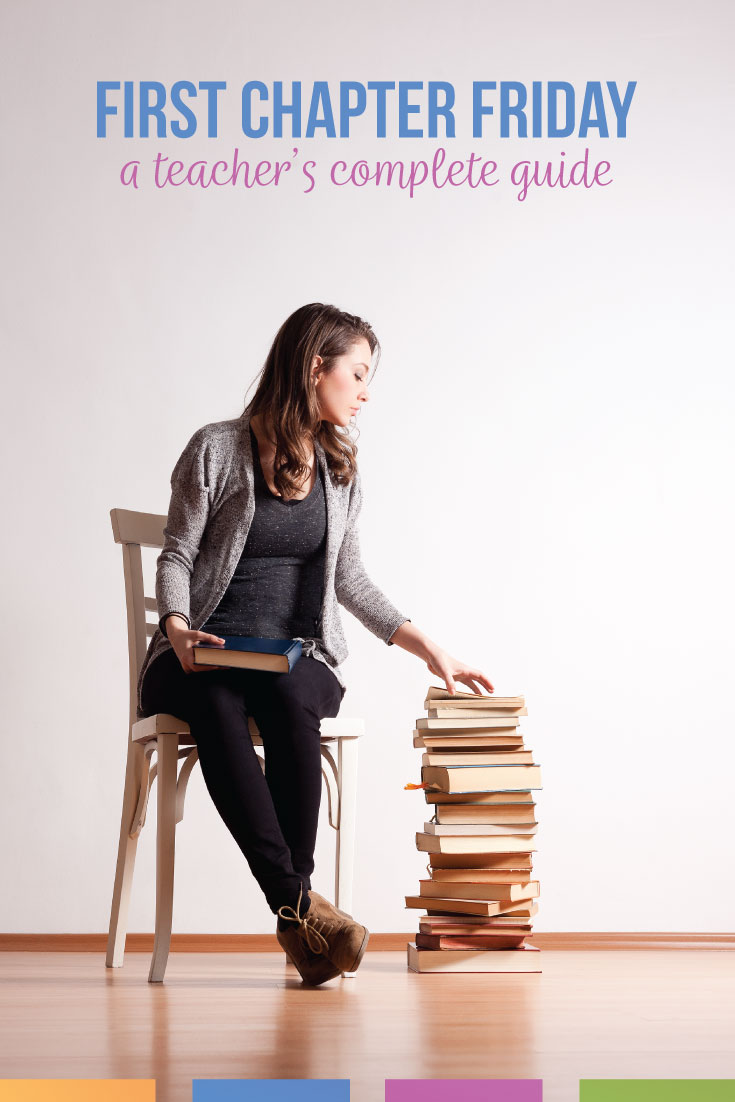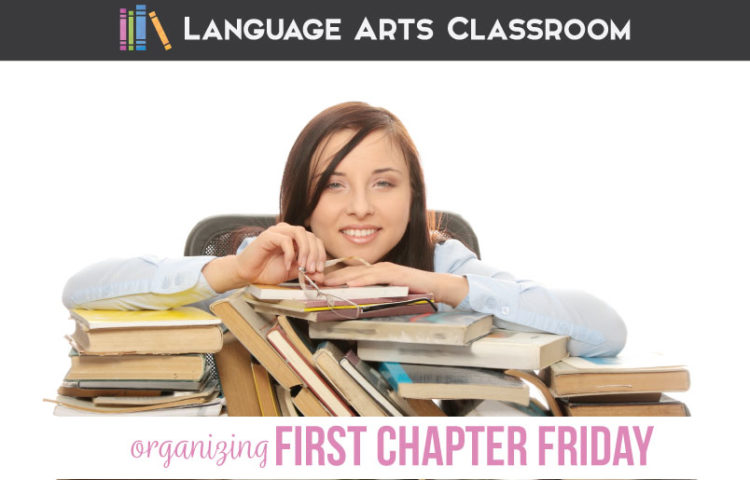As you asked: the Teacher’s Guide to Organizing First Chapter Friday. Improve classroom management and relationships with students with these First Chapter Friday, high school ideas.
Many people ask me questions about grammar. The second most requested bits of information are about First Chapter Friday.
I adore talking about books and First Chapter Friday is about sharing the love of books, so I’m happy to explain. If you’d like to follow my journey, I post my book choice every Thursday night on Instagram. You can also follow #FirstChapterFriday for all teacher picks. (If you have NO idea what FCF is, read my First Chapter Friday post that explains the process.)
Basically, First Chapter Friday is a time of reading to your students with the hope that a student will ask to read the book. The first chapter often hooks students, and if no one asks to borrow the book, you still spent quality time reading with your students. I spend about ten minutes every Friday with my students, simply reading to them.

That’s the overview, but what about a longterm plan? When I survey my process, I realized my steps are quite easy. So! Here you go: my Teacher’s Guide to Organizing First Chapter Friday (FCF).
Choose Books
Before you choose your books, decide what your goal(s) of First Chapter Friday is. For me, I want:
- to showcase different authors and genres
- to get books into the hands of students
- to provide windows and mirrors for every student
That’s it, and largely, it’s why I never attach work to FCF. Other teachers require students to track their books or rate the book read, but with my guidelines, I require students to pay attention. I’ve only done FCF with freshmen and sophomores, and I can sincerely say that behavior is not an issue. My desire is focused students, students intentionally listening to a story.
I bring my goals to mind when choosing books. Choosing books is a never-ending process, but luckily, I love books and the process never seems like a chore. I speak with my colleagues about books they are reading because my students will benefit if I know about books outside of my comfort zone. My librarian shows me books that might work, and after a few weeks of FCF, students do too. Choosing books is very much a collaborative effort.
For spring of 2020, I am close to having all of my books planned. I will probably add a few in after my students and I build relationships. That way, students comfortably tell me what they want to hear. My considerations so far:
Dear Martin, The Sun is Also a Star, What You Hide, Unwind, Things We Know by Heart, Lilac Girls, Frankly in Love, American Panda, Darius the Great is Not Okay, Fatal Throne, and Eragon: Inheritance.
So, eleven books so far, six female and five male authors. I personally love Frankly in Love and want to share it with students, but I believe in sharing other genres. I consulted my school librarian to get some fantasy books on that list (books I would normally not read). I’ll show students this list and take feedback. Part of organizing books for First Chapter Friday is talking to you colleagues.
Set Guidelines
As I mentioned, I don’t attach work to FCF. My one guideline is that students pay attention. They may doodle or draw pictures, but that really is all I ask them to do. I DO NOT attach work to First Chapter Friday.
Often, students will sit on the floor around me and listen. Every classroom differs, so find what works for you.
I stress the guidelines (really, I only have one!) the first few times, and then I remind students if necessary. These guidelines and the process of First Chapter Friday (high school students) really improves classroom management and student relationships.
Invite Guests
I’ve implemented FCF three semesters. This previous semester, I sent out a Google Spreadsheet to all the administrators in my building. It was a simple form: my open hours and dates. Administrators who wanted to read filled out the form. A few days before their chosen date, I sent a reminder and explained how FCF works in my classroom. The day of our honored guests, I reminded students our our guidelines. The next class period, students signed a homemade thank-you note.
This upcoming semester, I plan to invite other teachers, counselors, and outside administrators. (I also had a crazy idea that my seniors might like it if their old teachers read to them, to say good-bye to the district in a sort of way. I don’t have that ironed out, and I am not sure about the logistics!)
I don’t invite bookstore owners. I’ve seen some teachers do this, and I struggle with the idea of my audience (impressionable teenagers) being targeted for sales. Sure, some students could afford transportation to the bookstore and the actual book, but not all can. I think many students would tune out if they knew that the speaker was selling to them. The more I work with First Chapter Friday, the more I focus it on positive reading vibes, a variety of genres and authors, and the windows and mirror metaphor. I want to show that adults read, but I dislike the idea of advertising to my students.
I hope that this Teacher’s Guide to Organizing First Chapter Friday inspires and helps you. I’d love for you to pass along the information to other teachers who want to implement First Chapter Friday into their classrooms but are not sure where to begin. If you’re looking for tools to engage students with First Chapter Friday, you can access downloads through my library.
Reap the Benefits
I simply have not found a downside to First Chapter Friday. The benefits of engagement with books are overwhelming.
Overall, students look forward to my reading, they ask questions about literature and authors, and they focus in class. Behavior is improved. If you invite guests to read, those teachers or administrators now have a connection with students.
Another benefit is less obvious, and it might be controversial. I do NOT attach any homework or assignment when I read with students. I know some teachers ask students to complete a survey or write a review. My opinion is that students should have the opportunity to experience reading for pleasure without work involved. Some students do not experience reading outside of school. If we want students to enjoy reading, we should provide them time to experience the beauty of reading without a cute worksheet or activity attached to it. First Chapter Friday should be fun so that students realize the enjoyment of discovering new books, genres, and authors. As one of the first people to implement FCF, I think work attached to the experience diminishes it.
Finally, another benefit is your growing stack of books. Students will suggest books based on what you read. Other teachers and your librarian will share related topics. Your wealthy will grow.
And of course, I would appreciate more books to add to my list. Leave any ideas in the comments.


